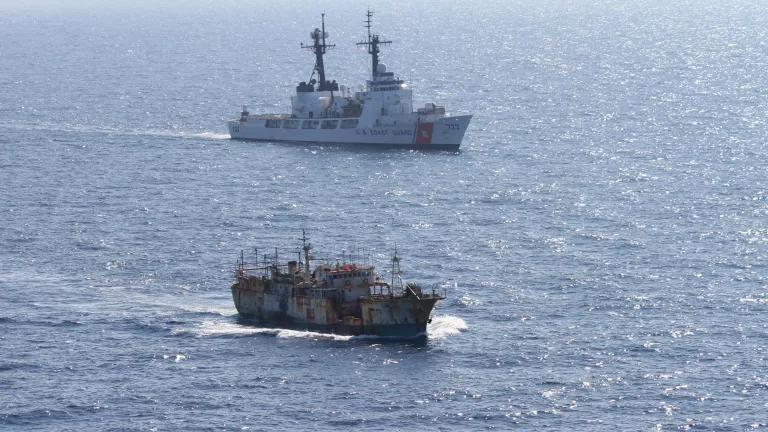Will the U.S. Realize the Promise of the UN Ocean Conference?
The U.N. Ocean Conference in Lisbon offers the promise of ramped up U.S. ambition to combat IUU fishing and forced labor at sea.

USCG boards an IUU fishing vessel
United States Coast Guard
The world’s ocean is imperiled—recent studies on ocean health lay bare its vulnerable state. The pressures of industrial scale fishing, offshore oil and gas development, habitat destruction, and pollution jeopardize the ocean’s ability to feed us, keep our planet cool, and deliver 50 percent of the air we breathe.
Today, June 27, 2022, heads of state, regional and local governments, indigenous leaders, NGOs, and businesses will come together in Lisbon for the United Nations Ocean Conference (UNOC) to offer and negotiate solutions to preserving and restoring ocean health. International collaboration is necessary given the global and interrelated nature of ocean threats. The United States, as one of the world’s top three seafood importers, has a critical opportunity to support sustainable fisheries by ramping up its ambition to stop illegal, unreported, and unregulated (IUU) fishing.
IUU fishing threatens commercial fish stocks, along with protected species and the ocean habitats that support marine wildlife. In addition to harming ocean biodiversity, IUU fishing is directly linked to human and labor rights abuses. The United States embraced its leadership role in stemming IUU fishing eight years ago, yet progress has stalled out in recent years as the National Oceanic and Atmospheric Administration (NOAA) has failed to follow through on previous commitments. NOAA has also demurred from opportunities to use U.S. authorities to stop IUU fishing at the source and to block IUU fished products from U.S. commerce.
There are three major actions to stop IUU fishing NRDC hopes the United States will announce this week in Lisbon:
1. Expand and strengthen seafood traceability requirements.
In 2014, the United States affirmed the importance of full supply chain traceability as necessary to curtail IUU fishing. Seafood supply chains are long and complex and include many points at which legal and illegal seafood can become co-mingled. In the absence of seafood traceability, it becomes nearly impossible to link an IUU seafood shipment to an illegal fishing operation, thus enabling IUU fishing operations to continue unchecked.
Seafood traceability is necessary to enforce the ban on Russian seafood imports and the Tariff Act, the United States’ law that prohibits goods produced with forced or trafficked labor. Although the United States has a seafood traceability program—the Seafood Import Monitoring Program (SIMP)—its requirements currently only extend to 45 percent of U.S. seafood imports, creating a major gap in coverage and a gaping loophole bad actors can easily exploit.
To block IUU-fished imports from commerce more effectively, NOAA must also make improvements to the existing program. NOAA should modernize the way it screens seafood imports and use artificial intelligence to identify shipments most at risk of IUU fishing. To support enforcement efforts, NOAA should also require as conditions of import: the unique identifier associated with a fishing vessel (e.g., mobile maritime service identity number, International Maritime Organization number), use of GPS tracking while underway (e.g., use of Automatic Identification System [AIS]), and information about crew working conditions.
2. Strengthen U.S. tools to ban seafood from countries that produce seafood using IUU fishing methods and/or forced labor.
The United States has the authority to ban seafood harvested using IUU fishing methods under the High Seas Driftnet Fishing Moratorium Protection Act. However, NOAA has underutilized it, failing to impose sanctions against countries that tolerate and enable IUU fishing, despite the Act’s power. To strengthen implementation of the High Seas Driftnet Act, Congress mandated that NOAA change the definition of IUU fishing in the Act, yet NOAA has not done so. NOAA should promptly change the definition of IUU fishing and should interpret that definition to include forced labor and human rights violations through updated regulations.
3. Increase transparency of global fishing operations.
The opacity of fishing operations is one of the drivers of IUU fishing and forced labor. Using readily available tracking technology, such as AIS, is one of the ways to illuminate fishing operations and enforce against human rights abuses at sea. To require use of this tracking technology as a condition of import, the United States must require the same of its fishing fleet. The U.S. Coast Guard supports use of AIS because it enhances vessels’ safety at sea.
The UN Ocean Conference is an opportunity for world leaders to make the commitments we need to protect the ocean for the health and enjoyment of future generations. Ambitious U.S. action to combat IUU fishing and associated human rights abuses is a necessary component of meeting this goal.




